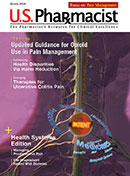About 10% of immunocompetent older patients with herpes zoster (HZ) develop complications, and that significantly increases the already large economic burden of shingles, according to a new study. The report in Vaccine advises, however, that vaccination offsets some of the burden, including that related to HZ complications.
The study team led by RTI Health Solutions points out that HZ incidence increases with age, and as populations age worldwide, the burden of HZ will also grow. Researchers sought to quantify the incremental healthcare-resource utilization and associated costs of patients with common HZ-related complications other than postherpetic neuralgia—cutaneous, neurologic, and ophthalmic—compared with uncomplicated HZ.
To do that, they conducted a retrospective cohort study of commercial health insurance claims covering about 40 million immunocompetent adults aged 50 years or older from 2008 to 2013, with follow-up for 1 year after HZ onset. The analysis included 22,948 HZ patients—60% women, median age 62 years—who experienced at least one of the selected complications during the 5-year study period; those patients were compared to 213,232 others—63% women, median age 61 years—with uncomplicated HZ.
The researchers recorded and calculated all-cause healthcare-resource utilization and direct healthcare costs from 6 months before until 12 months after HZ onset. The mean costs for HZ patients with complications then were compared to the mean costs for patients with uncomplicated HZ.
Results indicate that, overall, the mean annual incremental unadjusted costs for the patients with HZ-related complications were $4,716 in U.S. dollars, ranging from $2,173 for ophthalmic to $18,323 for neurologic complications.
The study team points out that most of the incremental costs associated with HZ complications were accrued during the first quarter after HZ onset. In addition, the researchers note that, for each complication type, the incremental costs increased with age up to, but not including, the oldest group: patients aged 80 years and older.
“Preventing HZ through achieving a high vaccination coverage of older adults with effective vaccines will lead to substantial savings in healthcare costs for HZ complications that extend beyond the costs of caring for uncomplicated HZ cases,” the study authors conclude. “These cost offsets should be taken into account when considering vaccination strategies against HZ and the costs involved.”
« Click here to return to Vaccine Update.
Published April 29, 2019





